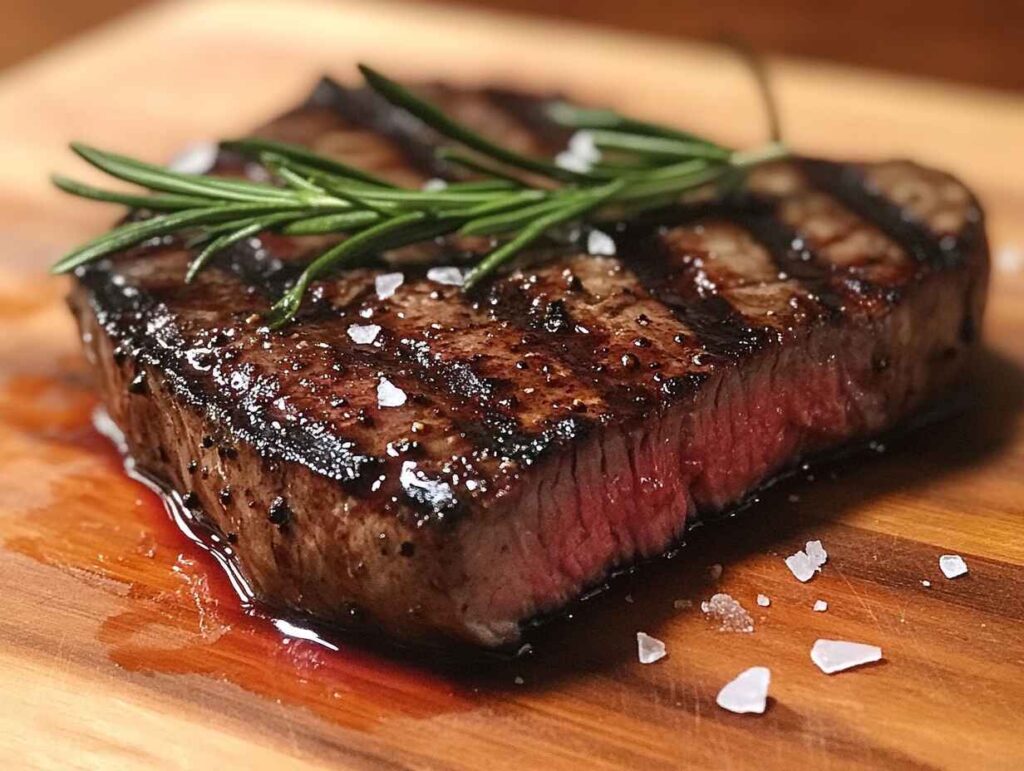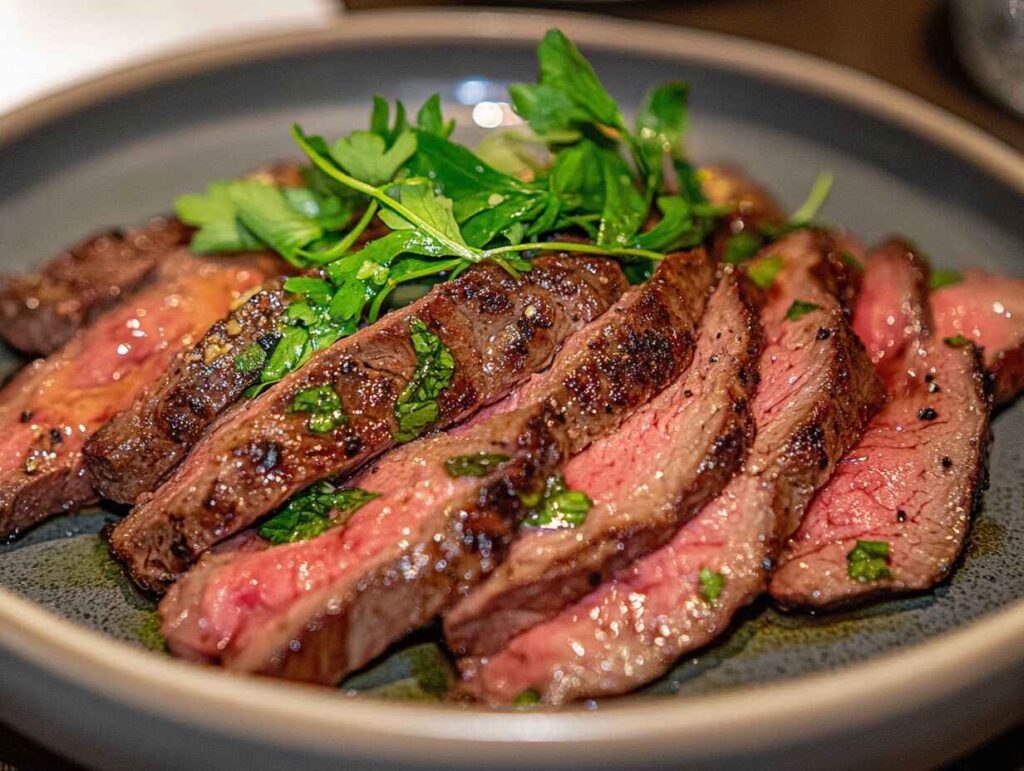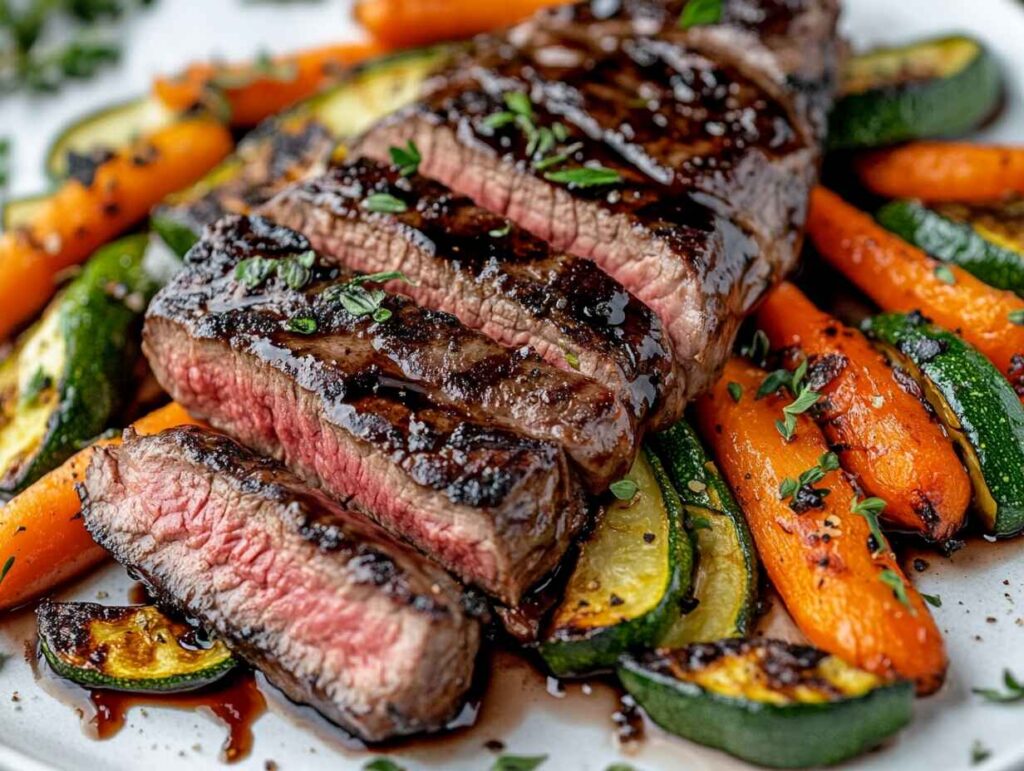Is Wagyu Beef Healthy ?
Wagyu beef is often celebrated for its rich marbling, unparalleled tenderness, and melt-in-your-mouth texture. But when it comes to health, many wonder—is Wagyu beef healthy? This premium cut of beef stands apart not only for its flavor but also for its unique nutritional profile.
Whether you’re a foodie, a health enthusiast, or someone looking to indulge in a luxurious meal, understanding the health benefits and potential concerns of Wagyu beef can help you make informed choices. In this guide, we’ll break down its nutritional content, health benefits, cooking tips, and more to help you decide if it deserves a place on your plate.

Table of Contents
What Is Wagyu Beef?
Wagyu beef isn’t just any steak. It’s a product of careful breeding, specialized feeding techniques, and meticulous care. The word “Wagyu” translates to “Japanese cow,” and it’s known for its intricate marbling and buttery texture.
The Origins of Wagyu
Wagyu cattle trace their roots back to Japan, where they were initially used for agricultural purposes. Over time, selective breeding created a unique genetic makeup, resulting in the high-quality meat we enjoy today. For those craving something equally satisfying, Boneless Beef Chuck Roast roast offers a comforting, hearty alternative.
What Makes Wagyu Unique?
- Marbling: Wagyu is prized for its intramuscular fat, which gives it a melt-in-your-mouth texture.
- Flavor: The marbling enhances the beef’s rich, buttery taste.
- Tenderness: Thanks to the fine fat distribution, Wagyu is incredibly tender and requires minimal seasoning.
Block Quote: “Wagyu’s luxurious texture and taste come from its unparalleled marbling, making it a cut above the rest.”
Nutritional Profile of Wagyu Beef
Wagyu beef is as unique in its nutritional value as it is in its flavor. While it’s known for its high fat content, many of these fats are considered healthier than those found in regular beef.
Calories and Macros
Here’s a breakdown of the average nutritional values per 3-ounce serving of Wagyu beef:
| Nutrient | Amount |
|---|---|
| Calories | 230–300 |
| Protein | 22–25 grams |
| Total Fat | 20–25 grams |
| Saturated Fat | 8–10 grams |
| Cholesterol | 70 milligrams |
| Omega-3 Fatty Acids | 0.8–1.2 grams |
| Omega-6 Fatty Acids | 1.2–1.5 grams |
Pro Tip: “The high fat content in Wagyu includes monounsaturated fats, which are better for heart health than saturated fats.”
Wagyu vs. Regular Beef Nutrition
When compared to regular beef, Wagyu stands out in several ways:
- Higher Healthy Fats: Wagyu contains more monounsaturated fats, which are linked to better cholesterol levels.
- Lower Saturated Fats: Despite its marbling, it has a balanced fat profile that is considered healthier.
- More Omega Fatty Acids: Wagyu provides higher levels of omega-3 and omega-6 fatty acids, which support heart and brain health.
Block Quote: “Wagyu beef isn’t just indulgent—it’s a source of heart-healthy fats and essential nutrients.”
Health Benefits of Wagyu Beef
While Wagyu beef is known for its luxurious taste, it also offers several health benefits, making it more than just a treat for the palate.

Rich in Healthy Fats
One of the standout features of Wagyu beef is its high content of monounsaturated fats (MUFAs). These fats are considered “good fats” because they can:
- Help lower bad cholesterol (LDL) levels.
- Support cardiovascular health.
- Provide long-lasting energy.
Pro Tip: “The high levels of oleic acid in Wagyu give it both its unique flavor and its heart-healthy reputation.”
Omega-3 and Omega-6 Fatty Acids
Wagyu beef contains significant amounts of omega-3 and omega-6 fatty acids, which are essential for:
- Brain Health: Supporting cognitive function and reducing the risk of neurological conditions.
- Heart Health: Helping to regulate cholesterol and reduce inflammation.
- Joint Health: Easing inflammation in joints, particularly for individuals with arthritis.
Block Quote: “With its omega-rich profile, Wagyu beef is a luxurious way to nourish your body and support overall well-being.”
High-Quality Protein
Every serving of Wagyu beef is packed with complete protein, containing all nine essential amino acids. These proteins are essential for:
- Building and repairing muscles.
- Supporting a healthy immune system.
- Promoting satiety, making you feel full for longer.
Why Can’t You Eat a Lot of Wagyu Beef?
Wagyu beef is undeniably delicious, but it’s not something you’d want to eat in large quantities. Here’s why moderation is key when indulging in this premium cut.
High Calorie and Fat Content
Wagyu’s incredible marbling is both its signature feature and its reason for indulgence in moderation:
- Calorie-Dense: With 230–300 calories per 3-ounce serving, it can quickly add up if consumed in large portions.
- Fat-Rich: While the fats in Wagyu are healthier than those in regular beef, they still contribute to overall fat intake.
Pro Tip: “A smaller serving size allows you to savor Wagyu’s richness without exceeding your daily caloric needs.”
Portion Control and Moderation
To fully enjoy Wagyu without overindulging, consider these tips:
- Keep Portions Small: A 3–4 ounce serving is usually enough to satisfy your palate.
- Pair with Healthy Sides: Light sides like steamed vegetables or salads balance out the richness of Wagyu.
- Savor Slowly: Wagyu’s flavor is intense, so eating it slowly helps you appreciate its taste without overeating.
Block Quote: “Wagyu is about quality, not quantity. A small portion is all you need to enjoy its luxurious flavor.”
Comparing Wagyu Beef with Other Proteins
When evaluating Wagyu beef for health benefits, it’s helpful to see how it stacks up against other common proteins like salmon and chicken.
Is Wagyu Healthier Than Salmon?
While both Wagyu beef and salmon are rich in healthy fats, they differ in key ways:
- Omega Fatty Acids: Salmon has higher omega-3 content, which is ideal for heart and brain health.
- Calories: Salmon is generally lower in calories per serving, making it better for calorie-conscious diets.
- Protein Quality: Both provide high-quality protein, but salmon’s leaner profile makes it more suitable for everyday meals.
Pro Tip: “Think of Wagyu as an indulgence and salmon as an everyday healthy protein option.”
How Does Wagyu Compare to Chicken?
Chicken is a lean protein often chosen for its versatility and lower fat content, but Wagyu holds its own:
- Calories and Fat: Chicken breast is significantly leaner, with fewer calories and almost no saturated fat. Wagyu, on the other hand, offers rich flavor due to its marbling.
- Micronutrients: Wagyu contains more iron and zinc, which are vital for energy and immune support.
- Satisfaction Factor: While chicken is great for large portions, Wagyu’s intense flavor makes a small serving feel indulgent.
Cooking Methods That Preserve Nutrition
To make the most of Wagyu beef’s nutritional benefits, choosing the right cooking method is essential. The goal is to highlight its natural flavor while maintaining its rich nutrient profile.
Grilling and Broiling
Grilling and broiling are excellent ways to cook Wagyu without adding extra fat:
- Why It Works: High heat locks in flavor and creates a delicious crust while allowing excess fat to render.
- Tips:
- Preheat the grill or broiler for even cooking.
- Keep cooking time short to prevent overcooking and preserve tenderness.
Low-Oil Searing Techniques
Searing Wagyu in a pan brings out its incredible marbling and buttery texture:
- How to Do It:
- Heat a cast-iron skillet until it’s smoking hot.
- Lightly season the Wagyu with salt and pepper.
- Sear for 1–2 minutes per side to create a golden crust.
- Why It’s Healthy: This method uses the beef’s natural fat for cooking, eliminating the need for added oils.
Pro Tip: “Let Wagyu rest for 5 minutes after cooking to allow the juices to redistribute evenly.”
Sous Vide for Precision Cooking
For perfect doneness, sous vide is an unbeatable method:
- How It Works:
- Seal the Wagyu in a vacuum bag and cook it in a water bath at a precise temperature (125–130°F for medium-rare).
- Finish with a quick sear in a hot skillet to develop a flavorful crust.
- Why It’s Effective: Sous vide retains more nutrients by avoiding high-temperature cooking.
Common Myths About Wagyu Beef
Wagyu beef is often surrounded by myths and misconceptions. Let’s separate fact from fiction to better understand this luxurious meat.
Does Wagyu Have More Cholesterol?
Myth: Wagyu beef is unhealthier than other beef because it contains more cholesterol.
Fact: While Wagyu has cholesterol, its levels are comparable to those of regular beef. Additionally, the higher monounsaturated fat content in Wagyu can support healthy cholesterol levels.
Is Wagyu Too Fatty to Be Healthy?
Myth: The marbling in Wagyu makes it an unhealthy choice.
Fact: The fat in Wagyu consists largely of monounsaturated fats, which are considered healthier than the saturated fats found in many other beef cuts. These fats can benefit heart health when consumed in moderation.
Pro Tip: “Don’t let the fat content scare you—Wagyu’s high-quality fats can be part of a balanced diet.”
Does Marbling Affect the Taste?
Myth: More marbling means Wagyu will always taste better.
Fact: While marbling enhances tenderness and flavor, the cooking method and seasoning also play a significant role in the final taste.
Block Quote: “Understanding the facts about Wagyu helps you enjoy it fully without falling for common misconceptions.”
What Part of a Cow Is Wagyu?
Wagyu beef is prized for its incredible marbling and tenderness, but what makes it unique is the specific cuts derived from Wagyu cattle. Let’s explore the most popular parts of Wagyu and what sets them apart.
Breakdown of Wagyu Cuts
Here are some of the most sought-after Wagyu cuts:
- Ribeye: Known for its rich marbling and buttery texture, making it a favorite for steak lovers.
- Sirloin: A leaner cut compared to ribeye, ideal for those who prefer a balance of flavor and fat.
- Tenderloin: Extremely tender and mild in flavor, perfect for special occasions.
- Chuck Roll: This cut is versatile and often used for slow cooking or ground Wagyu dishes.
Pro Tip: “Each Wagyu cut offers a distinct flavor and texture, catering to a variety of culinary preferences.”
Which Cuts Are Healthiest?
While Wagyu is indulgent, some cuts are better suited for health-conscious eaters:
- Tenderloin: With its lower fat content, tenderloin is a healthier option while still delivering great flavor.
- Top Sirloin: This leaner cut offers high protein content without the richness of ribeye or chuck.
- Ground Wagyu: Opt for a lean ground blend to enjoy Wagyu in burgers or tacos without overindulging in fat.
Block Quote: “Choosing the right cut of Wagyu can balance indulgence with nutrition, making it a versatile option for any meal.”
Pairing Wagyu Beef with Sides
Wagyu beef’s rich flavor and luxurious texture shine even brighter when paired with the right sides. Whether you’re looking for something light or complementary, here are some perfect accompaniments.
Light and Healthy Vegetable Sides

Balance the richness of Wagyu with fresh, healthy vegetables:
- Roasted Asparagus: The earthy flavor of asparagus pairs beautifully with the buttery texture of Wagyu.
- Steamed Broccoli: A simple side that adds a touch of freshness to the plate.
- Grilled Zucchini: Lightly seasoned zucchini slices provide a mild and slightly smoky contrast.
- Cheesy garlic zucchini steaks bring a perfect balance to the plate, complementing the richness of Wagyu
Pro Tip: “Drizzle a bit of olive oil and lemon juice over your vegetables for an extra burst of flavor.”
Low-Carb Pairing Options
For a low-carb meal, try these sides:
- Cauliflower Mash: A creamy, low-carb alternative to mashed potatoes.
- Sauteed Spinach: Lightly sautéed spinach adds a healthy dose of greens without overpowering the main dish.
- Ratatouille: This classic French vegetable medley complements Wagyu’s richness.
Block Quote: “Light and low-carb sides can create a well-rounded meal that highlights Wagyu’s decadent flavors.”
Frequently Asked Questions
Here are answers to common questions about Wagyu beef to help you better understand its nutritional value, taste, and preparation.
Is Wagyu Beef Healthier Than Normal Beef?
Yes, Wagyu beef contains more monounsaturated fats, which are better for heart health compared to the saturated fats found in regular beef. Its high omega-3 and omega-6 content also supports brain and heart health.
Is Wagyu Beef High in Cholesterol?
While Wagyu beef does contain cholesterol, it is similar to regular beef. The healthier fat composition in Wagyu can help maintain balanced cholesterol levels when consumed in moderation.
Is Wagyu Healthier Than Salmon?
Wagyu and salmon both offer unique health benefits. While Wagyu is rich in healthy fats and protein, salmon has higher omega-3 fatty acids and fewer calories, making it a better everyday choice for heart health.
What Part of a Cow Is Wagyu?
Wagyu isn’t a specific part of the cow—it refers to the breed of cattle. Cuts like ribeye, sirloin, and tenderloin from Wagyu cattle are particularly prized for their marbling and tenderness.
What Does Wagyu Taste Like?
Wagyu beef has a rich, buttery flavor with a melt-in-your-mouth texture, thanks to its high marbling. The taste is more luxurious and nuanced compared to regular beef. For an innovative way to enjoy Wagyu’s buttery texture, explore unique Wagyu recipes like Wagyu Beef Tartare
Pro Tip: “Understanding Wagyu’s unique qualities helps you fully enjoy its flavor and health benefits.”
Conclusion: Is Wagyu Worth It for Your Health?
Wagyu beef isn’t just a luxurious indulgence; it’s a unique source of high-quality nutrition. With its rich marbling, abundant omega-3 and omega-6 fatty acids, and complete protein, it offers health benefits that rival its exceptional flavor. However, due to its calorie-dense profile, moderation is key to enjoying Wagyu as part of a balanced diet.
Whether you’re savoring a perfectly grilled ribeye or experimenting with creative Wagyu recipes, this premium beef can elevate any meal. By pairing it with healthy sides and choosing the right cut, you can indulge in the decadence of Wagyu while staying mindful of your health.
Block Quote: “Wagyu isn’t just a treat for the palate—it’s a testament to how quality ingredients can nourish both body and soul.”
Now that you’ve learned about the health aspects of Wagyu beef, why not explore how to prepare it to perfection? Whether you grill, broil, or sear, the key is savoring every bite.
